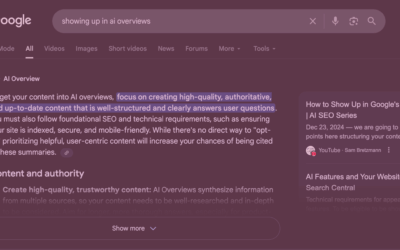The search game just changed completely. AI models like ChatGPT, Claude, and Perplexity are becoming the new Google for millions of users. They’re not just answering questions – they’re deciding which brands get mentioned and which ones disappear.
Here’s what most people don’t realize: links still matter in AI search. Maybe even more than before.
When ChatGPT recommends software or Claude suggests a service, they’re pulling from the same authority signals that Google uses. Strong backlink profiles help you show up in AI responses, get mentioned as a trusted source, and stay relevant as search evolves.
If you’re not building links with AI search in mind, you’re missing the biggest shift in digital marketing since mobile.
Why Links Matter More in AI Search
AI models need to figure out what’s credible and what’s not. They can’t visit every website or verify every claim manually. So they rely on the same trust signals that traditional search engines use.
Links are still the internet’s voting system. When authoritative sites link to you, AI models see that as proof you’re worth mentioning.
But here’s the twist: AI search results don’t show 10 blue links. They mention 2-3 sources max. That means the competition for AI visibility is even fiercer than traditional SEO.
The sites that show up in AI responses have strong link profiles, high domain authority, and lots of brand mentions across the web.
How AI Models Actually Use Links
When you ask ChatGPT “What’s the best project management software?” it’s not searching the web in real-time. It’s pulling from training data that included millions of web pages – and the sites with more authoritative backlinks had more influence on that training.
For newer AI models with web access, links matter even more. They help models quickly identify which sources are trustworthy when pulling live information.
Brand mentions without links also count. If your company gets mentioned frequently across reputable sites, AI models learn to associate your brand with credibility.
Co-citations matter too. When you’re mentioned alongside established industry leaders, AI models group you in the same category.
Traditional SEO vs AI Search Optimization
Traditional SEO focuses on ranking for specific keywords on Google. You optimize pages, build topic clusters, and chase featured snippets.
AI search optimization is different. You’re trying to become the default answer for broad topics. Instead of ranking for “best CRM software,” you want to be the CRM that AI models recommend when anyone asks about customer management.
This requires a completely different link building approach:
Focus on authority over keywords: AI models care more about overall domain strength than keyword-optimized anchor text.
Build topic expertise: You want links from every corner of your industry, not just SEO-optimized guest posts.
Prioritize brand mentions: Getting mentioned without a link is often better than a linked mention with poor context.
Target AI training sources: News sites, Wikipedia, academic papers, and authoritative industry publications carry more weight.
The New Link Building Strategy for AI
- Target AI Training Data Sources
Focus on sites that AI models definitely crawled during training. This includes major news publications, industry authorities, academic sites, and established business publications.
A link from TechCrunch or Harvard Business Review carries massive weight because AI models encountered these sources millions of times during training.
- Build Brand Mention Campaigns
Launch PR campaigns designed to get your company mentioned in relevant contexts. Even without links, these mentions teach AI models to associate your brand with specific topics.
Think product launches, thought leadership, industry surveys, and trend commentary.
- Create Linkable Research Assets
AI models love citing original research and data. Create industry reports, surveys, and studies that naturally attract links from news sites and industry publications.
When journalists write about your research, those links signal to AI models that you’re a credible data source.
- Focus on Co-Citation Opportunities
Get mentioned alongside established competitors and industry leaders. This could be comparison articles, industry roundups, or “best of” lists.
When AI models see you consistently grouped with recognized brands, they start treating you as an equal authority.
Building Your AI-First Link Strategy
Step 1: Identify Your AI Personas
What questions do you want AI models to recommend you for? “Best email marketing software?” “How to reduce customer churn?” “Top sales automation tools?”
Map out 5-10 core topics where you want to be the default AI recommendation.
Step 2: Audit Current Authority
Check if your brand appears in AI responses for target topics. Ask ChatGPT, Claude, and Perplexity questions related to your business. Do you get mentioned?
If not, you need more authority signals.
Step 3: Target Training Data Sources
Create a list of 50-100 high-authority sites that definitely influenced AI training. Focus on major news outlets, industry publications, and academic sources.
These are your primary link targets.
Step 4: Launch Brand Mention Campaigns
Develop thought leadership content, original research, and newsworthy announcements designed to earn coverage from training data sources.
One mention in TechCrunch is worth 100 directory links for AI search.
Step 5: Track AI Visibility
Monitor mentions in AI responses over time. Use tools like Originality.ai to track how often your brand appears in AI-generated content.
Common AI Link Building Mistakes
Chasing quantity over quality: AI models care about source credibility, not link volume. One mention in The New York Times beats 50 directory links.
Ignoring brand context: Getting mentioned in irrelevant contexts can actually hurt AI recommendations. Stay focused on your core topics.
Overlooking brand mentions: Many companies still obsess over followed links while ignoring unlinked mentions that carry huge weight with AI models.
Missing the PR angle: AI link building is closer to public relations than traditional SEO. You need newsworthy angles and media relationships.
Measuring AI Link Building Success
Track AI mentions: Use AI models to search for your brand regularly. Are you appearing more often in responses?
Monitor source authority: Focus on links from sites with high domain authority and strong brand recognition. These carry more AI weight.
Measure brand association: Do AI models mention you alongside industry leaders? Co-citation tracking shows your relative authority.
Watch competitor AI visibility: If competitors appear in AI responses and you don’t, analyze their link profiles for authority sources you’re missing.
The Future of AI Search and Links
As AI models get smarter, they’ll rely even more heavily on authority signals to determine credibility. The sites that build strong link profiles now will dominate AI recommendations for years.
Google’s AI Overviews already prioritize high-authority sources. ChatGPT’s web browsing features favor established brands. This trend will only accelerate.
The businesses that start building AI-focused link strategies today will own their categories in the AI search era.
Start simple: Identify 10 high-authority publications in your industry. Create content worth their coverage. One major mention can change your AI visibility overnight.
The future of search is here. Make sure AI models know who you are.



